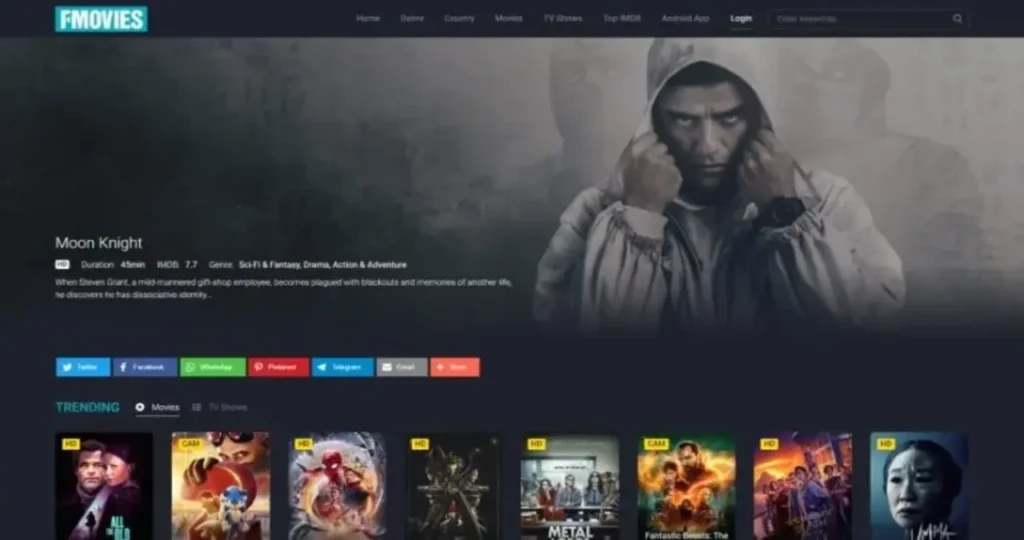Fmovie and the Evolution of Online Movie Streaming: A Deep Dive

Introduction
In the digital age, online movie streaming has revolutionized entertainment consumption. Fmovee, a popular platform among free streaming services, epitomizes this transformation. This article delves into how Fmovee has influenced the online movie streaming landscape and what it means for viewers and the industry.
The Emergence of Fmovie

Fmovie first appeared on the radar of movie enthusiasts as a convenient alternative to traditional cinema and pricey subscription services. With its user-friendly interface and a vast library of films and TV shows, Fmovee quickly gained traction. The platform offered an array of genres, from blockbuster movies to indie films, catering to a diverse audience. Its emergence signalled a shift in viewing habits, with more people opting for home entertainment over conventional movie-going experiences.
How Fmovie Works
Understanding the mechanics behind Fmovee is crucial for both users and analysts. The platform hosts links to films and series hosted by various third-party content providers. This model allows Fmovee to offer a broad selection of titles without hosting the content itself, navigating the complex terrain of digital copyright laws. However, this also poses risks and challenges, particularly concerning the legality and safety of streaming content from unofficial sources.
The Impact on the Entertainment Industry
Movie’s rise has had a profound impact on the entertainment industry. It has pressured traditional broadcasters and cinema operators to adapt and innovate. Many established companies have accelerated digital transformation, launching streaming services or partnering with existing platforms. Additionally, Fmovie has inadvertently highlighted the issue of accessibility, pushing for more reasonable pricing and better access to content globally.
Legal Challenges and Ethical Considerations
The legality of streaming from platforms like Fmovie is a contentious issue. These sites often operate in legal grey areas, leading to potential clashes with copyright holders and creators. The ethical implications of using such services are significant. They raise questions about the sustainability of the entertainment industry and fair compensation for creators. This section will explore these challenges in depth, discussing copyright laws, recent legal actions, and the broader ethical debates surrounding free streaming services.
Technological Advancements and User Experience
Fmovie and similar platforms have also driven technological advancements in streaming technology. Innovations such as improved compression algorithms, faster streaming protocols, and enhanced user interfaces have emerged from the competitive push to provide a better user experience. These technologies ensure that even users with limited internet capabilities can enjoy a smooth streaming experience.
The Role of Community and Social Interaction
An often-overlooked aspect of platforms like Fmovie is their role in fostering a community. Users not only come to watch films but also to engage with other viewers. Discussion forums, user reviews, and recommendation systems have turned movie watching from a solitary activity into a social experience. Despite the platform’s legal uncertainties, this community aspect has helped maintain user engagement and loyalty.
Future Trends in Online Movie Streaming
Looking ahead, the evolution of online movie streaming is likely to accelerate, with several trends shaping the future. These include the rise of virtual reality (VR) experiences, the integration of artificial intelligence (AI) for personalized recommendations, and a move towards more sustainable and legally sound business models in free streaming. Fmovie’s adaptability to these trends will be crucial for its continued relevance and growth.
Conclusion
Fmovie’s journey through the evolving landscape of online movie streaming reflects broader shifts in media consumption, technology, and legal frameworks. As viewers increasingly turn to digital platforms for entertainment, understanding the intricacies of services like Fmovie becomes essential. While it offers unparalleled convenience and variety, it also prompts meaningful conversations about the future of entertainment and digital rights. Whether Fmovie can navigate its challenges and evolve along with the industry remains to be seen, but its impact on the world of streaming is undeniable.
FAQs
What is Fmovie, and how does it differ from other streaming services?
Fmovie is a free streaming platform that provides users access to a vast library of movies and TV shows without a subscription. Unlike mainstream services like Netflix or Hulu, Fmovie does not host content but provides links to films and series hosted on third-party content providers.
Is it safe to use Fmovie to stream movies and TV shows?
While Fmovie offers a convenient way to watch various content, it operates in legal grey areas and often hosts links to third-party sites. This can expose users to security risks such as malware and phishing scams. To enhance safety, it’s recommended to use antivirus software and a VPN.
How does Fmovie impact the traditional movie and TV industry?
Fmovie and similar platforms have pressured traditional media outlets to innovate and adapt, leading to the rapid growth of legitimate streaming services and changes in how content is distributed and monetized. However, they also raise concerns about copyright infringement and fair compensation for creators.
Can using Fmovie lead to legal consequences for users?
The legality of using Fmovie largely depends on local copyright laws. Streaming copyrighted content without authorization in some jurisdictions can lead to fines or other legal consequences. Users should be aware of their country’s laws regarding copyright and streaming from unofficial sources.
What are the future challenges and opportunities for platforms like Fmovie?
The future for platforms like Fmovie involves navigating legal challenges, enhancing user safety, and potentially legitimizing their services. As the industry evolves, these platforms might need to consider forming partnerships with content creators or shifting towards a more sustainable and legal business model to continue operating in the competitive streaming market.





